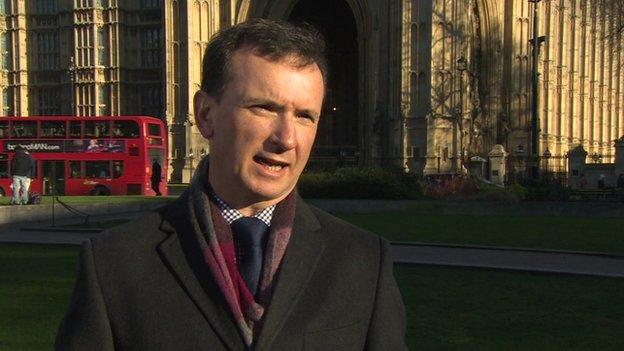Theresa May's Brexit Welsh powers pledge
- Published
- comments

Alun Cairns: 'Maintaining membership of the single market is effectively remaining part of the European Union by another name'
"The economic argument trumps everything else," said the secretary of state. "At the end of the day this is down to the economy, jobs, jobs, jobs.", external
There were, he said, 100,000 jobs in Wales directly linked to our place in Europe. "Business leaders tell me that they rely on our links with a market of 500 million people - that's a vast trading bloc that takes more than 40 per cent of the goods we export."
Indeed, the Conservative manifesto for the 2015 general election, external declared: "We benefit from the single market".
That was then, and this is Alun Cairns now: "Maintaining membership of the single market is effectively remaining part of the European Union by another name. Instead, we seek the greatest possible access to the single market through a new comprehensive, bold and ambitious free trade agreement."
'Recession'
The referendum changed everything and ministers who warned before June 23 last year that Brexit risked "the very real prospect of recession" are now making optimistic noises about the economic prospects of "global Britain".
What can Wales take away from Theresa May's speech on Brexit? The Welsh Government may have a seat at the table at the "joint ministerial committee on EU negotiations" but is there evidence it has influenced the UK government's approach?
Mrs May told her audience she was committed to keeping the devolved governments "fully engaged" in the process. "We have already received a paper from the Scottish government, and look forward to receiving a paper from the Welsh Government shortly.
"Both papers will be considered as part of this important process. We won't agree on everything, but I look forward to working with the administrations in Scotland, Wales and Northern Ireland to deliver a Brexit that works for the whole of the United Kingdom.
"Part of that will mean working very carefully to ensure that - as powers are repatriated from Brussels back to Britain - the right powers are returned to Westminster, and the right powers are passed to the devolved administrations of Scotland, Wales and Northern Ireland."
'No Barriers'
I asked Alun Cairns which powers they might be. He said: "The prime minister rightly spoke about the Welsh Government being part of a negotiation through the joint ministerial committee. I work closely with the first minister. This is about the right deal for the whole of the UK."
So whatever powers they might be, either the government doesn't know yet or isn't saying. But Mrs May added: "As we do so, our guiding principle must be to ensure that - as we leave the European Union - no new barriers to living and doing business within our own Union are created,
"That means maintaining the necessary common standards and frameworks for our own domestic market, empowering the UK as an open, trading nation to strike the best trade deals around the world, and protecting the common resources of our islands.
"And as we do this, I should equally be clear that no decisions currently taken by the devolved administrations will be removed from them."
Should the Welsh Government feel re-assured by this or does this leave enough room for a post-Brexit dispute over food subsidies and economic aid?